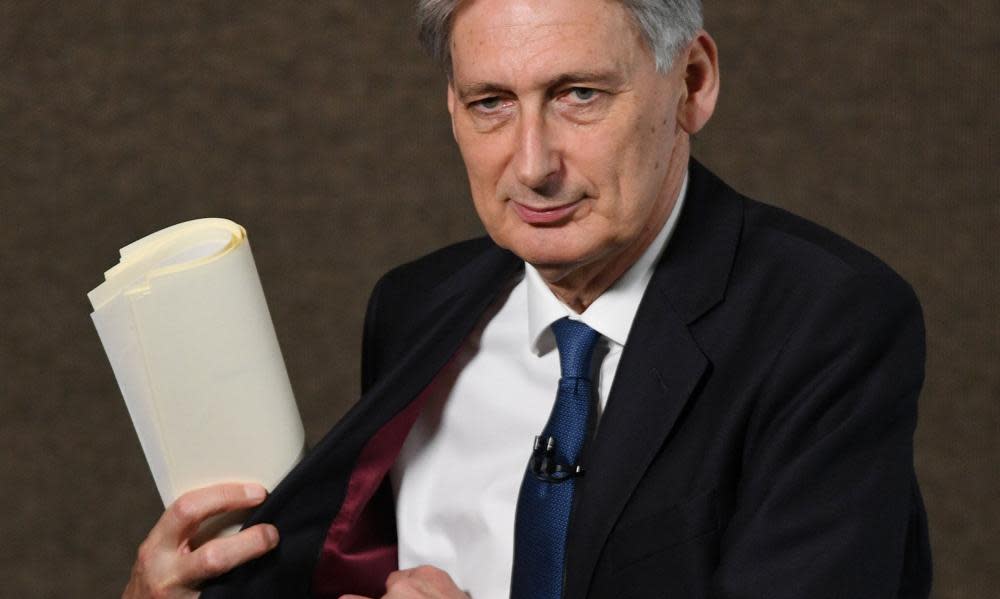Millions of families on brink face deepest benefit cuts in years

Families struggling to make ends meet will be hit by the biggest annual benefits cut for six years, according to a new analysis that exposes the impact of continuing austerity measures on the low paid.
Chancellor Philip Hammond is preparing to give a stripped-down spring statement on Tuesday, where he is expected to boast of lower than expected borrowing figures. He will use them to suggest Britain has reached a “turning point”.
He will point to forecasts showing the “first sustained fall in debt for a generation” to claim “there is light at the end of the tunnel” in turning around Britain’s finances.
However, he will be speaking just weeks before a further public spending squeeze will see the second largest annual cut to the benefits budget since the financial crash. According to new research by the Resolution Foundation thinktank, the changes from April will save around £2.5bn and dent the incomes of the “just about managing” families that Theresa May has vowed to help.
The cuts will affect around 11 million families, including 5 million of the struggling families that the prime minister stated she would focus on.
There will also be some good news for the low paid, with more than 1.5 million workers set to benefit from a 4.4% pay rise when the national living wage increases from £7.50 to £7.83 at the start of April. However, that measure will be outweighed by the effective £2.5bn cuts to working-age benefits.
While there were bigger cuts in 2012 when child benefit was removed from higher earners, this year’s squeeze will fall on low- and middle-income families. The new analysis suggests these families are set for an average loss of £190 this year alone, though some will be far worse off.
There are four key benefit cuts this year. Working-age benefits will be frozen for a third year, saving £1.9bn and affecting almost 11 million families. The 3% real-terms cut in working-age benefits this year will be by far the biggest of the freeze, set to last four years.
A measure limiting benefit claims to a family’s first two children, costing up to £2,780 for a family having a third child, saves £400m this year and affects 150,000 families.
The withdrawal of the family element of support for new tax credit and universal credit claims from families with children will cost families up to £545. It saves the public purse £200m this year and will affect 400,000 families.
Finally, the rollout of the controversial universal credit system, which combines several benefits into one payment, saves £200m because some claimants have lower entitlements compared with the existing system, especially the long-term sick and working families.
It comes just days after Paul Johnson, head of the respected Institute of Fiscal Studies, warned that Britain was “nowhere near out of austerity”.
New research by the Joseph Rowntree Foundation shows that the decision to press ahead and freeze most working-age benefits and tax credits this year would see a couple with two children left £380 worse off compared with a scenario in which their universal credit claim had increased in line with prices.
Labour is planning to embarrass the government and Tory MPs on Tuesday by forcing them to have a vote on controversial changes that are set to leave some poor families without free school meals for their children or free childcare.
David Finch, chief analyst at the Resolution Foundation, said that upgrades to Britain’s short-term economic outlook “won’t change the fact that families across Britain still face a huge living standards crunch in the coming years, some of which is a direct result of government policy”.
“The chancellor is keen to stick to his brief of a short speech with no new policies,” he said. “But given the financial challenges facing families across Britain, a quick change of his predecessor’s policies on benefit cuts would go a long way towards showing that he is on the side of hard-pressed working families.”
A government spokesman said: “We are spending more than £90bn a year on working-age welfare, and this will continue to rise.”

 Yahoo News
Yahoo News 
